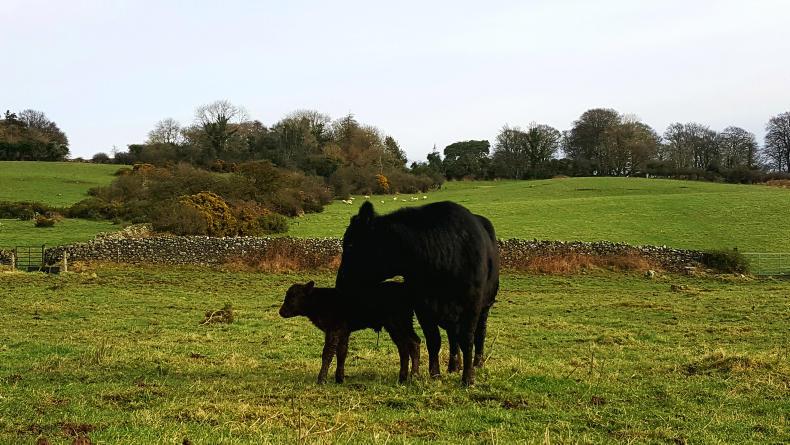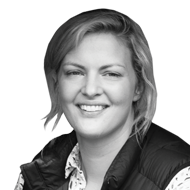“Sure clover is only an auld weed, what would you be at with it?” said a neighbouring dairy farmer recently.
I bit my tongue and listened to his plans for expansion.
‘It’s a numbers game Jane!’ he advised.
I’ve been thinking a lot recently about our inputs here on the farm and weighing up the advantages and disadvantages of our organic system. Unlike most organic farmers, it wasn’t my choice to convert to organics. My parents converted the farm over 20 years ago, so I grew up knowing no different.
For us, the environment and biodiversity is high up the priority list. It seems the big boys of Irish agriculture haven’t had much time for our so-called “niche” market in the past. I suppose the euro signs didn’t flash bright enough for them. The easiest thing was to scoff it all off and pat us hippies on the heads. But with encouraging growth recently, is organics emerging as a very real and viable option for future farmers?
Low input works for us
Our inputs are low in comparison to most farmers. Our present stocking rate lets us out-winter the sucklers on dry, hilly ground. It works for us.
The spring calvers have just started calving outdoors and we find calves are healthier and better looked after. The Angus allows for easy calving and minimal issues at birth, keeping labour costs down.
However, expansion is going to cause a tipping point in our current system.
Expansion – increasing suckler numbers and housing
While most advice at the moment is to decrease suckler numbers, we kept replacements on for autumn calving later in the year. We will more than likely do the same again this year if we can take the hit financially.
Previously we were calving down from three years but a decision was made to reduce this and aim closer to two years. Suddenly the shed is pretty full.
‘A quality street’ selection of weanlings, replacement heifers and a handful of finishers are alongside the flock of sheep who are in to lamb.
If we want to increase numbers with the current system, suckler housing will have to be looked into. Our grass growth is behind conventional farmers and the minimal FYM we produce is supplemented with imported slurry, which is not ideal.

The production of feed on farm, if possible, is high in the organic ethos. Currently we don’t feed any grain as we don’t produce it and we have gotten away with finishing on grass and red clover alone.
The better of the Angus steers are pushing 350kg carcass weight. I have ear marked ground for more red clover, which will be sown in late spring to ground that has never seen a plough, in order to boost the finishing cattle next winter.
It’s encouraging to see Ken Gill feature as the first organic farmer in the BETTER farm beef challenge programme and I hope this will go some way to highlighting the growing scope but also the limitations in organic beef production.
It’s easy to get starry eyed about upping numbers.
Don’t automatically assume the more inputs you have, the more money you will make – that’s how people get into trouble.
Jane Shackleton is an organic beef and sheep farmer from Co Cavan.
Read more
Read more of Jane’s Farmer Write’s columns
“Sure clover is only an auld weed, what would you be at with it?” said a neighbouring dairy farmer recently.
I bit my tongue and listened to his plans for expansion.
‘It’s a numbers game Jane!’ he advised.
I’ve been thinking a lot recently about our inputs here on the farm and weighing up the advantages and disadvantages of our organic system. Unlike most organic farmers, it wasn’t my choice to convert to organics. My parents converted the farm over 20 years ago, so I grew up knowing no different.
For us, the environment and biodiversity is high up the priority list. It seems the big boys of Irish agriculture haven’t had much time for our so-called “niche” market in the past. I suppose the euro signs didn’t flash bright enough for them. The easiest thing was to scoff it all off and pat us hippies on the heads. But with encouraging growth recently, is organics emerging as a very real and viable option for future farmers?
Low input works for us
Our inputs are low in comparison to most farmers. Our present stocking rate lets us out-winter the sucklers on dry, hilly ground. It works for us.
The spring calvers have just started calving outdoors and we find calves are healthier and better looked after. The Angus allows for easy calving and minimal issues at birth, keeping labour costs down.
However, expansion is going to cause a tipping point in our current system.
Expansion – increasing suckler numbers and housing
While most advice at the moment is to decrease suckler numbers, we kept replacements on for autumn calving later in the year. We will more than likely do the same again this year if we can take the hit financially.
Previously we were calving down from three years but a decision was made to reduce this and aim closer to two years. Suddenly the shed is pretty full.
‘A quality street’ selection of weanlings, replacement heifers and a handful of finishers are alongside the flock of sheep who are in to lamb.
If we want to increase numbers with the current system, suckler housing will have to be looked into. Our grass growth is behind conventional farmers and the minimal FYM we produce is supplemented with imported slurry, which is not ideal.

The production of feed on farm, if possible, is high in the organic ethos. Currently we don’t feed any grain as we don’t produce it and we have gotten away with finishing on grass and red clover alone.
The better of the Angus steers are pushing 350kg carcass weight. I have ear marked ground for more red clover, which will be sown in late spring to ground that has never seen a plough, in order to boost the finishing cattle next winter.
It’s encouraging to see Ken Gill feature as the first organic farmer in the BETTER farm beef challenge programme and I hope this will go some way to highlighting the growing scope but also the limitations in organic beef production.
It’s easy to get starry eyed about upping numbers.
Don’t automatically assume the more inputs you have, the more money you will make – that’s how people get into trouble.
Jane Shackleton is an organic beef and sheep farmer from Co Cavan.
Read more
Read more of Jane’s Farmer Write’s columns







 This is a subscriber-only article
This is a subscriber-only article












SHARING OPTIONS: